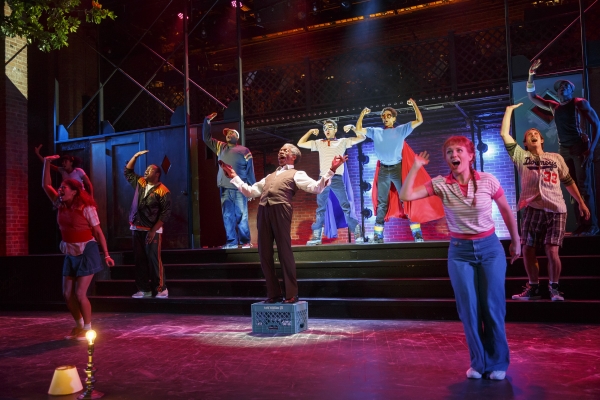The Fortress of Solitude
This thrilling song of Brooklyn is as volatile as the borough in which it takes place.

(© Joan Marcus)
Adolescent trouble-making: Sometimes it leads to a successful career as a writer; other times it lands you in prison. Of course, this disparity of results largely depends on factors beyond our control. Conceived and directed by Daniel Aukin (Bad Jews), The Fortress of Solitude (now making its New York debut at the Public Theater) exposes the cruel gravitational pull of class and race in America with a catchy pop score and a story that charges forward with the relentless energy of an out-of-control locomotive.
Based on Jonathan Lethem's novel, the musical follows Dylan Ebdus (Adam Chanler-Berat), a white kid growing up in a mostly black section of Gowanus, Brooklyn, in the late 1970s. His mother, Rachel (Kristen Sieh), dreams of a brave new post-racial society and refuses to raise her child in the segregated suburbs. Unfortunately she runs away to Berkeley before she can see her dream come to fruition, leaving Dylan at the mercy of the neighborhood bully, Robert Woolfolk (Brian Tyree Henry). Dylan's father (Ken Barnett) is too occupied with his paintings to protect his son, so Dylan has to find a way to save himself.
Dylan discovers an ally in Mingus Rude (Kyle Beltran), the cool kid on the block. Mingus' father, Barrett Rude Junior (Kevin Mambo), was the lead singer of The Subtle Distinction, a soul group that Dylan admires greatly, owing to the extensive vinyl collection that his mother left him. Mingus and Dylan spend hours listening to his records. They also bond over graffiti (or "tagging") and comic books. One day, when Dylan gives Mingus the ring his mother left him, the two seem to gain the ability to fly, allowing them to tag higher and higher in the city. This superhero friendship is able to defeat all obstacles, that is until Dylan gets into Stuyvesant High School in Manhattan and Mingus stays behind at the local school in Brooklyn.
Magical realism aside, squeezing 528 pages of any novel onto the stage is a difficult proposition. Amazingly, book writer Itamar Moses has managed to distill the essence of Lethem's story into a brisk and efficient two and a half hours. He's helped along by Michael Friedman, who has composed one of the most tuneful scores in years. Friedman creates shiver-inducing numbers in soul, funk, and hip-hop. Rap often feels awkward on the stage, but it is intelligently employed here to highlight Friedman's witty and thoughtful lyrics while pushing the story forward. Words and themes return throughout like Wagnerian motifs (a clever conceit in this story about a magical ring), helping to hold the narrative together over a massive expanse of time and space.
Every member of the cast undergoes an astounding transformation as the '70s of Act 1 cede to the '90s of Act 2. Beltran in particular realistically embodies an intelligent man with a magnetic personality whose life slowly grinds him into a mess of nerves and anger. "You all think you're working the system, but the system is working you," he raps at the audience as he guides us through his multiple stints in prison. As the father of a jailbird, in the second act Mambo is practically unrecognizable. It's hard to believe that this is the man who was just pouring out his soul and honey-coated voice over an infectious pop melody.
In stark contrast, David Rossmer brings a joyful zest to the role of Arthur, the only other white kid on the block. He transforms from nebbish to thug to successful entrepreneur (as Gowanus transforms into Boerum Hill), all the while bringing a giggle to an audience in desperate need of a laugh in this often heavy story. Thanks to his character's privilege, he can afford to be the comic relief.
Jessica Pabst's costumes make social position easily ascertainable at first glance, a difficult task in an era when everyone wears "casual." Her massive costume plot encompasses poor-kid realness, music journo chic, and a surprisingly diverse array of prison looks. Hair and wig designer Leah J. Loukas helps to augment the character transformations, especially that of Barrett Junior. His preacher father, Barrett Senior (a vigorous and shockingly authentic André De Shields), sports a three-piece suit and severely relaxed hair à la Reverend Al Sharpton.
Director Aukin elegantly navigates music, magic, time, and change to stage a very complex story dealing with a difficult subject. While some might accuse The Fortress of Solitude of being messy and raw, its appeal derives from the fact that it leaves so much for the audience to ponder, long after the final curtain falls.









